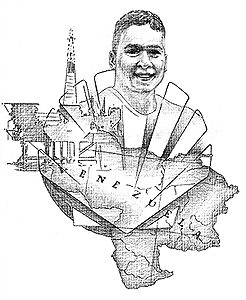



By Bonnie Gelbwasser
Antonio Josè Delgado Parra came full circle when he returned to Venezuela this summer to begin his career as a development engineer with Shell Oil Co. in Maracaibo. The second oldest of four children of a cab driver and a secretary, Tony Delgado grew up in Maracay, a city of about 2.5 million people located about 50 miles southwest of Caracas.

Education has always been important to his family. "Neither of my parents got past high school," he says, "but they knew how hard life is out there when you don't have an advanced education, and they made sure it did not happen to us. They wanted their children to enjoy the comfort and security of a well-paying, professional job."
In his senior year of high school, Tony was among 3,500 students selected by Fundayacucho, a Venezuelan institution funded by the government, to compete for scholarships to colleges and universities throughout the world. The program requires recipients to work in Venezuela for two years after they graduate from college. Delgado was one of only 250 to receive the scholarship.
In September 1991, he left home to spend a year learning English at the Colorado School of Mines. The people at Fundayacucho and LASPAU (the Latin American Scholars Program at American Universities), which administers the scholarships, suggested WPI because of its project program. "I wanted an interactive program," he says. "One that would give me a lot of experience in the workplace as well as the classroom."
Energetic, enthusiastic and curious about everything, he quickly immersed himself in his courses, in work, and in extracurricular activities. Depending on the term or the time of day, he could be found working in the Projects Office, in Gordon Library, or in the Provost's Office, tutoring Spanish for the Humanities and Arts Department, working as a resident advisor for the Strive and Frontiers programs, or serving as a member or an officer in the Hispanic Students Association and the Society of Hispanic Professional Engineers (he was HPE president during his senior year). During his four years on campus, he also managed to take part in two award-winning projects in two countries at opposite ends of the globe and to add two new languages to his repertoire.
"After I started working in the Projects Office," he says, "I saw all these people going out of the country to do projects and I thought, 'This is something I would like to do." Through the Global Perspective Program, he was able to do his Interactive Qualifying Project (IQP) in Innichen, on the border between Italy and Austria, and his Major Qualifying Project (MQP) at the University of Puerto Rico in Mayaguez.
In the summer of 1994, six students in two teams traveled to San Candido, on the Italian side of Innichen, to examine the feasibility of establishing a WPI project center and to study the impact of tourism. The teammates surveyed farmers, tourists and town officials to find out how they felt about the area's growing tourist industry and its potential impact on 26 mountain farms that line the slope above the town. Delgado, who had taken courses in German and Italian at WPI, gave his part of the presentation to town officials in Italian. The project was a finalist in the 1994 President's IQP Awards Competition.
One year later, he traveled to Puerto Rico to do one of the first MQPs completed at the University of Puerto Rico, Mayaguez. As part of a four-person team, he undertook a bench-scale study of the bioremediation of petroleum-contaminated sand. The project focused on bioaugmentation and biostimulation as a way of enhancing the removal of total petroleum hydrocarbons. The project, sponsored by BFI, won first prize in the Student Technical Papers Competition of the Northeast Region of the American Society of Engineering Education this past spring.
As he begins his career back home, Delgado says he is excited to be returning to his family and friends and is ready for the challenges of being one of the first employees hired by a company anxious to make its mark on Venezuela's economy. "Venezuela is one of the world's largest oil producers and exporters," he says. "The country's oil industry was nationalized in 1975, but in recent years the government has begun offering concessions to encourage companies to establish businesses there."
Shell responded and is recruiting many new people to work in Venezuela on the company's new zero-spill platform in Maracaibo Lake. "More than anything else," he says, "WPI taught me how to solve problems and get results. I learned how to be a professional, to not only analyze a problem from an engineering perspective, but see the social implications and the environmental impact of technology. I am ready to start my new job."